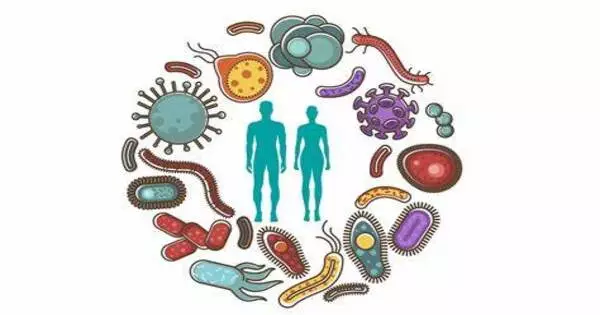The human microbiome is a collection of trillions of microorganisms that live in various parts of the human body, including bacteria, viruses, fungi, and other microbes. The human microbiome is the collection of all microbiota that live on or within human tissues and biofluids, as well as the anatomical sites where they live, which include the skin, mammary glands, seminal fluid, uterus, ovarian follicles, lung, saliva, oral mucosa, conjunctiva, biliary tract, and gastrointestinal tract.
These microorganisms play an important role in health maintenance and the regulation of various physiological processes. Bacteria, archaea, fungi, protists, and viruses are all types of human microbiota. Despite the fact that micro-animals can live on the human body, they are typically excluded from this definition. The term human microbiome is sometimes used in the context of genomics to refer to the collective genomes of resident microorganisms; however, the term human metagenome has the same meaning.
Key points about the human microbiome include:
- Diversity: The microbiome is extremely diverse and varies from person to person. Microbial communities differ between body sites, such as the skin, mouth, gut, and urogenital tract.
- Functions: The microbiome is involved in many important functions, including digestion, nutrient metabolism, immune system development, and pathogen defense. Microbes in the gut, for example, aid in the breakdown of complex carbohydrates and the production of certain vitamins.
- Gut Microbiome: Because of its importance to human health, the gut microbiome has received a lot of attention. It aids digestion, nutrient absorption, and the synthesis of certain vitamins. Furthermore, the gut microbiome has been linked to immune function and may influence the risk of a variety of diseases, such as inflammatory bowel disease and metabolic disorders.
- Dynamic Nature: The composition of the microbiome can change over time, influenced by factors such as diet, antibiotics, lifestyle, and environmental exposures. Disruptions in the balance of the microbiome, known as dysbiosis, have been associated with various health conditions.
- Interaction with the Immune System: The microbiome interacts with the immune system, helping to train it and regulate its responses. This interaction is crucial for maintaining a balanced and appropriately responsive immune system.
Current research is looking into the role of the microbiome in a variety of health conditions such as obesity, diabetes, autoimmune diseases, and mental health disorders. Probiotics and fecal microbiota transplantation are being studied for their ability to modulate the microbiome and treat specific conditions.
Understanding the human microbiome has provided new opportunities for personalized medicine and the development of targeted interventions to promote health and treat diseases by modulating the microbial communities within the body.
















